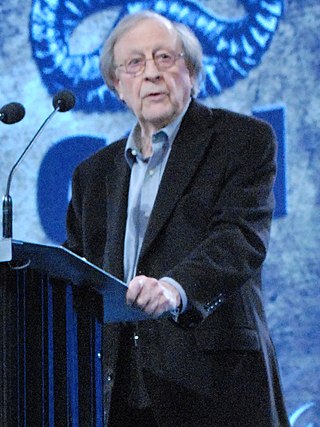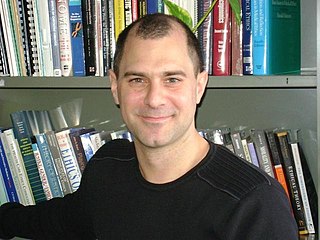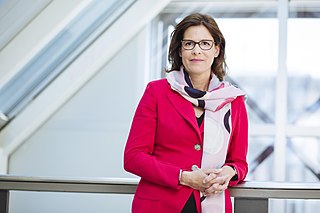
The Université du Québec à Montréal, is a French-language public research university based in Montreal, Quebec, Canada. It is the largest constituent element of the Université du Québec system.

The Université de Sherbrooke is a French-language public research university in Sherbrooke, Quebec, Canada, with a second campus in Longueuil, a suburb on the South Shore of Montreal. It is one of two universities in the Estrie region of Quebec, and the only French-language university for the region.

The Université de Moncton is a Canadian francophone university in New Brunswick. It includes campuses in Edmundston, Moncton, and Shippagan.

Université TÉLUQ is a public French-language distance learning university, part of the Université du Québec system. Originally founded in 1972 as the Telé-université, Université du Québec commission to develop distance education courses, Université TÉLUQ is now a full university which offers programs in undergraduate and graduate studies. It is the only French-language university education institution in North America to offer all of its courses and programs at all three university cycles remotely and continuously. Though it is based in Quebec City, Quebec, about two thirds of its professors work from its Montreal offices.

The Université du Québec à Rimouski is a public university located in Rimouski, Quebec, Canada with a campus in Lévis.

Françoise David is a former spokesperson of Québec solidaire – a left-wing, feminist, and sovereigntist political party in the province of Quebec, Canada. She was elected to serve as the Member of the National Assembly of Quebec for the riding of Gouin in the 2012 Quebec election, and then again in the 2014 Quebec election. Quebec Solidaire was born from the merger of Option Citoyenne with l'Union des Forces Progressistes. She is the author of the book/manifesto Bien commun recherché – une option citoyenne which attempts to combine the concepts of "common good", social justice, ecology and economic democracy into a coherent political doctrine. On January 19, 2017, Françoise David announced her immediate retirement as both party spokesperson and as a Member of the National Assembly due to her health.

Guy Arthur Auguste Rocher is a Canadian academic and sociologist.

Roger Gaudry, was a Canadian chemist, businessman, corporate director, and rector of the Université de Montréal.

Jean-Claude Guédon is a Quebec-based academic.

The University of Limoges is a French public university, based in Limoges. Its chancellor is the rector of the Academy of Limoges. It counts more than 16,000 students and near 1,000 scholars and researchers. It offers complete curricula up to the doctorates and beyond in the traditional areas of knowledge. It was structured in October 1968 by the grouping of higher education institutions in Limoges. The oldest historical continuity is that of the faculties of pharmacy and medicine dating back to 1626.
Luc Vinet is a Canadian physicist and mathematician. He was former rector of the Université de Montréal between 2005 and 2010. He is the CEO of IVADO, created in 2015 since August 2021.
Expenditures by Canadian universities on scientific research and development accounted for about 40% of all spending on scientific research and development in Canada in 2006.
Pavel Hamet is a doctor, researcher, editor, academic administrator and teacher in Quebec, Canada.
Jorge Niosi was an Argentine-born Canadian academic who was a professor at the Université du Québec à Montréal from 1970. He became a Full Professor in 1984, and a member of the Department of Management and Technology at the School of Management Science, UQAM. From 2001 to 2015, he was the Chairholder of Canada Research Chair on the Management of Technology and Technology Policy. He was the founder of CREDIT, of which he was the director from 1986 to 1993. Right after that, he became director of CIRST of which he was a regular member. He held a 3rd cycle degree in economics from the Institut d’études du développement économique et social, and a doctoral 3rd cycle degree in sociology from the École pratique des hautes études. His doctoral thesis was published in 1974, then translated in French as Les entrepreneurs dans la politique Argentine. That first book was followed by 14 others, some of which were also translated, the latest being Building National and Regional Innovation Systems. His latest book published in Spanish in Buenos Aires is called: Construir la Nueva Economía Argentina.

Benoît Lacroix was a Quebec theologian, philosopher, Dominican priest, professor in medieval studies and historian of the Medieval period, and author of almost 50 works and a great number of articles.

The Maillé affair concerns a court ordinance obtained by a private company to force scientist Marie-Ève Maillé to give access to data exposing the identity of her research participants. The researcher documented the conflicts that arose in a municipality of Québec in the context of a windfarm project. Dr. Maillé, adjunct professor at Université du Québec à Montréal, refused to comply to the ordinance because it contravened the ethical duty of preserving the privacy of research data. The ordinance was retracted in May 2017.

Bryn Williams-Jones is a Canadian bioethicist, professor and director of the Department of Social and Preventive Medicine at the School of Public Health, Université de Montréal. He is co-founder and editor-in-chief of the Canadian Journal of Bioethics/Revue canadienne de bioéthique, the first open access bilingual bioethics journal in Canada, and co-director of the Ethics branch of the International Observatory on the Social Impact of AI and Digital Technology (OBVIA). Williams-Jones is a member of the Centre for Research in Public Health (CReSP), the Centre for Ethics Research (CRÉ), the Institute for Applied Ethics (IDÉA) of the Université Laval, and fellow of The Hastings Center.
COUPERIN is an academic consortium in France. Formed in 1999, it includes more than 250 universities, research organizations, Grandes écoles (schools), COMUE, and others. The consortium negotiates with publishers the prices and conditions of access to scientific publications and other digital resources for the benefit of its members. It promotes open science, particularly with regard to scientific publications, both nationally and internationally. It is headquartered in Paris.

Sophie D'Amours is a Canadian engineer and a professor at Université Laval. On April 26, 2017, she was elected the 26th rector of Université Laval, the first woman to hold the position.
Louise Dandurand (1950–2016) was a Canadian political scientist and administrator of university research in Canada.













